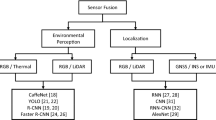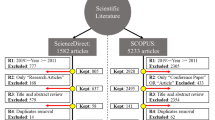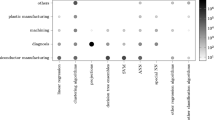Abstract
Production decisions in real dynamic flexible manufacturing systems (FMS), especially in the early stages are often made with limited information. Information is limited because scheduling knowledge is hard to establish in such an environment. Though the machine learning technique in the field of Artificial Intelligence is thus used for this task by many researchers, this research is aimed at increasing the accuracy of machine learning for FMS scheduling using small data sets. Approaches used include data-fuzzifying, domain range expansion, and the application of adaptive-network-based fuzzy inference systems (ANFIS). The results indicate that learning accuracy under this strategy is significantly better than that of a traditional crisp data neural networks.
Similar content being viewed by others
References
Li DC, Chen LS, Lin YS (2003) Using functional virtual population as assistance to learn scheduling knowledge in dynamic manufacturing environments. Int J Prod Res 41(17):4011–4024
Li D, Wu C, Tong KY (1997) Using an unsupervised neural network and decision tree as knowledge acquisition tools for FMS scheduling. Int J Syst Sci 28(10):977–985
Li DC, Han KL, Tong KY (1996) A strategy for evolution of algorithms to increase the computational effectiveness of NP-hard scheduling problems. Eur J Oper Res 88:404–412
Li DC, She IS (1994) Using unsupervised learning technologies and simulation analysis to induce scheduling knowledge for flexible manufacturing systems. Int J Prod Res 32(9):2187–2199
Priore P, De La Fuente D, Gomez A, Puente J (2001) A review of machine learning in dynamic scheduling of flexible manufacturing systems. AIEDAM 15:251–263
Quinlan JR (1996) Learning decision tree classifiers. ACM Comput Surv 28(1):71–72
Shaw MJ, Park S, Raman N (1992) Intelligent scheduling with machine learning capabilities: the induction of scheduling knowledge. IIE Trans 24(2):156–168
Pierreval H, Ralambondrainy H (1990) A simulation and learning technique for generating knowledge about manufacturing systems behavior. J Oper Res Soc 41(6):461–474
Nakasuka S, Yoshida T (1992) Dynamic scheduling system utilizing machine learning as a knowledge acquisition tool. Int J Prod Res 30:411–431
Chen CC, Yih Y (1996) Identifying attributes for knowledge-based development in dynamic scheduling environments. Int J Prod Res 34(6):1739–1755
Sun YL, Yih Y (1996) An intelligent controller for manufacturing cells. Int J Prod Res 34(8):2353–2373
Sabuncuoglu I, Touhami S (2002) Simulation metamodelling with neural networks: an experimental investigation. Int J Prod Res 40:2483–2505
Jang JSR (1993) ANFIS: Adaptive-network-based fuzzy inference systems. IEEE Trans Syst Man Cybern 23(3):665–685
Lo SP (2002) The application of an ANFIS and grey system method in turning tool-failure detection. Intl J Adv Manuf Technol 19:564–572
Sugeno M, Kang GT (1988) Structure identification of fuzzy model. Fuzzy Set Syst 28:15–23
Takagi T, Sugeno M (1983) Derivation of fuzzy control rules from human operator’s control actions. In: Proceedings of the IFAC Symposium on Fuzzy Information, Knowledge Representation and Decision Analysis, July 1983, pp 55–60
Takagi T, Sugeno M (1985) Fuzzy identification of systems and its applications to modeling and control. IEEE T Syst Man Cybern 15:116–132
Srinivasan M, Moon YB (1997) A framework for a gold-driven approach to group technology applications using conceptual clustering. Int J Prod Res 35:1759–1773
Author information
Authors and Affiliations
Corresponding author
Rights and permissions
About this article
Cite this article
Li, DC., Wu, C. & Chang, F. Using data-fuzzification technology in small data set learning to improve FMS scheduling accuracy. Int J Adv Manuf Technol 27, 321–328 (2005). https://doi.org/10.1007/s00170-003-2184-y
Received:
Accepted:
Published:
Issue Date:
DOI: https://doi.org/10.1007/s00170-003-2184-y




